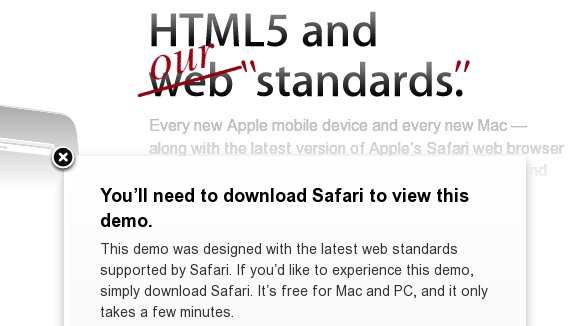
Standards are not about vendor lock in (or in the case of Apple, vendor lock out), they are about interoperability. Apple’s recent HTML5 showcase, more appropriately named Safari Showcase, reveals Apple does not understand standards. Locking out browsers, as Apple does in their showcase, is not a best practice or in any W3C specification. Apple’s quest against Adobe and flash is not noble—don’t get me wrong, I hate flash. They are not embracing standards, they are embracing something they can control.

Apple advertises their demos as a “HTML5 Showcase”, this could not be further from the truth. HTML5 is not this magical thing that will rid us of flash, and alone it will never will. HTML is just a markup language, just data and structure. It needs CSS for styling, and JavaScript to pick up the remaining bits. Truth be told, the showcase is more of a CSS3 showcase. The only demos that really used something from HTML5 are the audio and video demos (more on this later).
Everything else is CSS3—well not actually CSS3 as -webkit-gradient, -webkit-transform-origin and -webkit-animation-duration technically are not CSS3 properties. They are all proprietary, vendor specific stand ins that follow the W3C standard for naming proprietary properties. Regardless, it is CSS3 that is doing much of the heavy lifting in the demos, not HTML5.
Web Typography, that’s CSS3 magic. Web Gallery, that is CSS3 again plus a bit of JavaScript. Photo Transitions, once again, that is CSS3. 360°, again it is CSS3 with JavaScript. Finally, VR is yet another CSS3 demo.

If you spoof your user agent so that it is Safari, the video (and audio) demo reveals something interesting:
This demo contains H.264 video. Windows users can download QuickTime to enable support for this industry-standard format.
So an external codec is required, the point of the video tag in HTML5 was to remove the dependency on external applications/plugins. Apple must have been sleeping when this was discussed—oh wait, no they’re the ones actively pushing H.264 to be the standard HTML5 video tag codec. Looking at the container file for the H.264 video, there is no doubt Apple made these demos only for Safari–they used the .MOV container, only supported by Safari which does all of its audio/video support through Quicktime.
If you want to read more about HTML5 and see some demos that will work on your browser (assuming you are not using Internet Explorer), check out fellow Weblogs.us user StrChr’s HTML5 page.

-John Havlik
[end of transmission, stay tuned]

Nice post. It will be interesting to see how “HTML 5” plays out.
PS it is really nice that we have such a truly open (and popular) web browser in FireFox :-).
JD,
Yeah it is nice that Firefox is open. Chrome is as well (technically webkit is too), but I don’t like the feel of Chrome (I have it installed on my desktop to test Webkit support of sites). I know why people say it feels “snappy” and it is not due to it’s speed (it is fast, don’t get me wrong), but the “snappy” effect due to it not doing progressive rendering of the page (waits until everything loads then displays it).
-John Havlik
I went there as well and was directly off again when I saw that I need to download a Browser (and it was not able to even dig in further regardless of their javascript). Thanks for the report, you’re hitting good points here.
hakre,
Yeah, if you disable JavaScript it will let you get to the pages for the demos, but the demos won’t work as most of them depend on JavaScript in one way or another. The other thing that pisses my off is Apple’s redirection to the main html5 demo page when linking to a particular demo (I wish we could specify referrers in anchors, though that would be extremely evil).
-John Havlik
The web changes slowly only now these days. I can understand that vendors would like to turn the clock a bit faster, but wouldn’t there be the fighters for standards years ago, we would not be where we are. The rest we get these days is that even apple and microsoft become aware of those facts. But basically points have been made. HTML5 therefore is mostly hype only and in the end it’s so “modular” that we have browsers that offer non-standard things again but this time under the cape of following a standard – great to see how words turn over their meaning if you use them :D